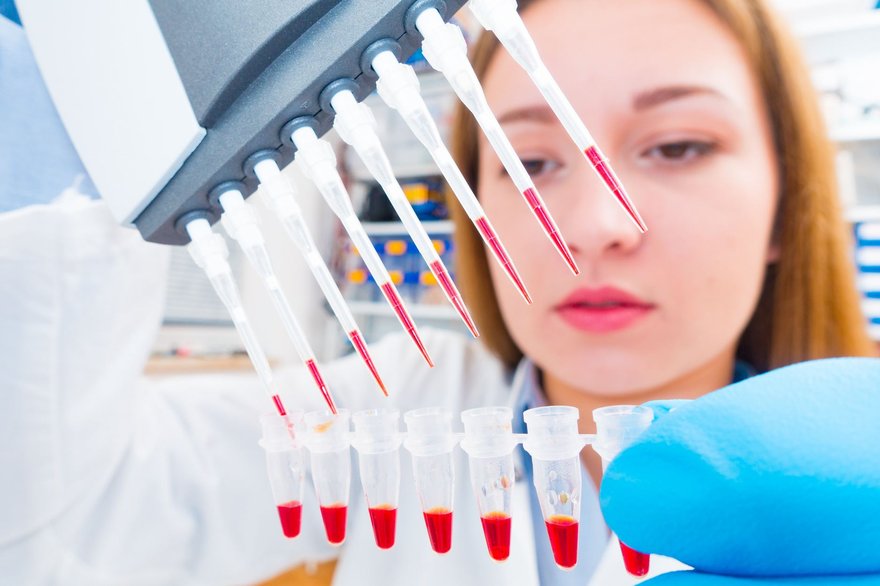Some scientists believe that we’re in the golden age of biotechnology. Scientific advances are creating new and previously only imaginable ways to treat and prevent diseases.
The biotech sector is also presenting exciting opportunities for investors. Many of the best biotech companies have both strong drug candidate pipelines and winning drugs already on the market.

Top biotech stocks in 2025
Top biotech stocks in 2025
These are a few biotech companies to watch closely in 2025:
| Company | Market Capitalization | Primary Focus |
|---|---|---|
| Axsome Therapeutics (NASDAQ:AXSM) | $6.4 billion | Neuroscience |
| BioNTech (NASDAQ:BNTX) | $29.4 billion | Cancer, immune diseases |
| Exelixis (NASDAQ:EXEL) | $9.9 billion | Cancer |
| Regeneron Pharmaceuticals (NASDAQ:REGN) | $74.1 billion | Autoimmune diseases, cancer, eye diseases, infectious diseases |
| Summit Therapeutics (NASDAQ:SMMT) | $16.1 billion | Cancer |
| Vertex Pharmaceuticals (NASDAQ:VRTX) | $119.1 billion | Rare diseases, diabetes, pain |
1. Axsome Therapeutics
Axsome's revenue is soaring thanks to strong momentum for two drugs -- Auvelity and Sunosi. The company launched Auvelity in October 2022 as a treatment for major depressive disorder. It acquired sleep disorder drug Sunosi from Jazz Pharmaceuticals (JAZZ -1.22%) in May 2022.
In January 2025, Axsome added a third product to its lineup with the U.S. Food and Drug Administration (FDA) approval of Sybravo in treating migraines. The drug could have significant commercial potential, with current migraine therapies not as effective as desired for many patients.
Other regulatory approvals could be on the way. Axsome plans to file for FDA approvals of AXS-05 (Auvelity) in treating Alzheimer's disease and AXS-12 in treating narcolepsy in 2025.
2. BioNTech
BioNTech hit the jackpot with its 2020 collaboration with Pfizer (PFE -1.74%) to develop a COVID-19 vaccine. Although sales for the vaccine the two partners market together, Comirnaty, have fallen since the end of the COVID-19 pandemic, BioNTech now has a huge cash stockpile as a result of the vaccine's success.
The German biotech innovator is still working on developing new vaccines for fighting viruses. It's evaluating a seasonal flu vaccine and a combination flu-COVID vaccine in late-stage testing. Both programs are collaborations with Pfizer.
However, BioNTech's big opportunity is in treating cancer. The company's pipeline includes two late-stage cancer therapies and 12 programs in phase 2 testing.
3. Exelixis
Exelixis has developed four drugs that are already on the market. Its biggest winner, by far, is Cabometyx, which is approved to treat renal cell carcinoma (RCC) and hepatocellular carcinoma (HC) -- the most common types of kidney cancer and liver cancer, respectively -- as well as thyroid cancer.
Exelixis and big drugmaker Bristol Myers Squibb (BMY -1.36%) won U.S. regulatory approval in early 2021 for the use of Cabometyx in combination with Bristol Myers' immunotherapy drug Opdivo. The company is also evaluating Cabometyx in combination with other drugs in late-stage studies targeting several types of cancer.
The next major growth driver for Exelixis could be zanzalintinib. The company expects to report results in the second half of 2025 from late-stage studies of the drug targeting colorectal cancer and non-clear cell renal cell carcinoma.
4. Regeneron
The biggest moneymaker for Regeneron is Eylea, an eye disease drug that the company makes in collaboration with Bayer (BAYR.Y 0.51%). All net sales from Eylea in the U.S. are awarded to Regeneron, and the company splits the revenue earned from markets outside the U.S. with Bayer.
Regeneron also has a lucrative partnership with Sanofi (SNY -0.2%), another life sciences and pharmaceutical company. Together, the two companies are marketing and selling the autoimmune disease drugs Dupixent and Kevzara, the cancer drugs Libtayo and Zaltrap, and the cholesterol drug Praluent.
The company won initial approval from the FDA in February 2021 for Evkeeza in treating homozygous familial hypercholesterolemia (HoFH), a rare form of high cholesterol, in patients ages 12 and older. It also picked up an additional approval for the drug in March 2023 for treating HoFH patients between the ages of 5 and 11.
Regeneron could soon add another drug to its lineup. The company anticipates FDA approval of linvoseltamab in treating relapsed/refractory multiple myeloma by mid-2025. Its pipeline also includes 13 late-stage programs.
5. Summit Therapeutics
Summit Therapeutics doesn't have any products on the market yet. However, that status could change in the not-too-distant future.
The company plans to announce results from a late-stage study evaluating ivonescimab in combination with chemotherapy as a second-line treatment for non-small cell lung cancer (NSCLC) in mid-2025. If these results are successful, it should pave the way for Summit to file for FDA approval of its experimental immunotherapy.
Ivonescimab is already approved in China as a second-line treatment for NSCLC in combination with chemotherapy. It's marketed in the country by Summit's partner, Akeso (AKES.F -3.92%). The drug also proved to be effective as a first-line treatment for NSCLC in a late-stage study conducted by Akeso. In this study, ivonescimab achieved significantly higher progression-free survival in first-line NSCLC patients than Merck's (MRK -2.54%) Keytruda.
6. Vertex Pharmaceuticals
Vertex, which makes multiple cystic fibrosis (CF) drugs, enjoys a monopoly over sales of treatments for the underlying cause of CF. Its dominance in CF was bolstered by the December 2024 approval of Alyftrek.
CF isn't Vertex's only market now, though. The big biotech company is ramping up commercialization efforts for Casgevy, a gene-editing therapy approved to treat two rare blood disorders -- sickle cell disease and transfusion-dependent beta-thalassemia.
Vertex also won FDA approval in January 2025 for Journavx (suzetrigine). This non-opioid drug is the first new type of pain medication approved in more than 20 years.
The company's pipeline looks especially promising. Vertex has four late-stage programs. It's evaluating suzetrigine in treating painful diabetic peripheral neuropathy. Inaxaplin is a potential treatment for APOL1-mediated kidney disease. Povetacicept targets another chronic kidney disease, IgA nephropathy. Vertex is also developing a potential cure for severe type 1 diabetes.

Understanding the biotech industry
Understanding the biotech industry
A biotechnology company uses living organisms such as bacteria or enzymes to make drugs. The use of living organisms differentiates biotechnology companies from pharmaceutical companies, which research and develop chemicals to invent drugs.
Investors should pay close attention to each phase of a biotech company's drug candidates. Drugs in later phases are more likely to succeed, making investing in that company less risky. There are four major steps and three phases that biotech companies follow to develop new drugs:
- Drug discovery: A biotech company first identifies a drug candidate and the diseases that it potentially can target.
- Preclinical testing: The company tests the drug candidates in vitro (in test tubes) and/or in vivo (in living animals such as mice).
- Clinical testing: The drug candidate is tested on humans. Clinical testing generally occurs in three phases:
- Phase 1: Small studies are conducted to find a safe dose for the drug candidate and determine how the drug affects humans.
- Phase 2: Larger studies involving around 100 or more patients are conducted with a focus on safety and short-term side effects and to determine the optimal dose for the drug.
- Phase 3: Even larger studies, with hundreds or even thousands of patients, are conducted to demonstrate how effectively and safely the experimental drug treats the target disease.
- Regulatory approval: A biotech company must obtain regulatory approval before it can sell a drug. The biotech company files for regulatory approval from the FDA, using the clinical testing data that it has generated.
Most biotech companies have many drugs simultaneously under development, which provides multiple revenue streams. The safest biotech investments are focused on more than just a few experimental drugs.
Many growing biotech companies often generate cash by issuing new shares of stock, which dilutes the value of the existing shares. Some biotechnology companies also receive -- and may be heavily dependent upon -- money obtained via partnerships with larger drugmakers or grants from government agencies and nonprofit organizations. Mergers and acquisitions are common in the biotech sector, which means that any of the most promising biotech companies could be acquired by their larger competitors.
Related investing topics
Should you invest?
Should you invest in biotech stocks?
Investing in biotech stocks can be risky because it's possible that a company's drug candidate proves ineffective or worse in clinical testing. And, even if testing goes well, biotech companies have no guarantee that a drug will be approved by the FDA.
The least risky biotech companies have drugs already commercially available and many drugs in later phases of testing. The best biotech companies also develop drug candidates with peak annual sales that are forecast to be high.
You can reduce your investment risk by focusing on biotech companies with strong financial positions. Biotech companies that already sell one or more drugs are much more likely to be profitable, and they are less likely to use creative means to generate the significant amounts of cash required to fund drug research and development (R&D). Biotech companies that are unprofitable are at risk of not having enough money to successfully fund clinical studies and complete regulatory filings to bring a new drug to market.
The best biotech companies are well-positioned to deliver tremendous returns over long periods of time, making them well-suited for buy-and-hold investors.







